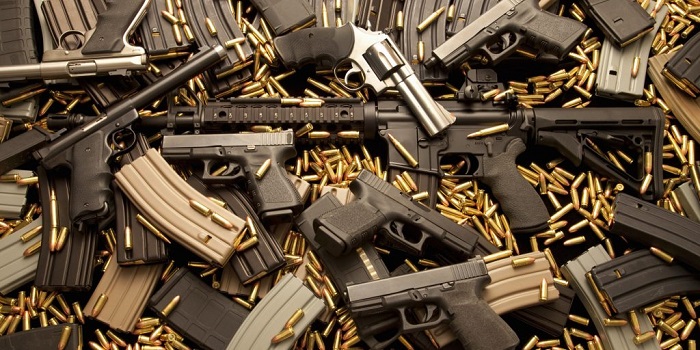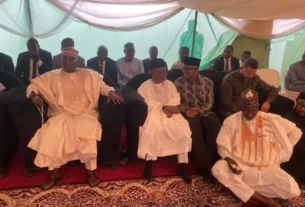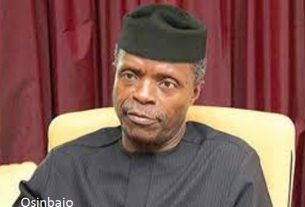
By Akanimo Sampson
THERE are growing concerns in some civic groups that the Federal Government is not yet ready to fight the illicit proliferation of Small Arms and Light Weapons (SALW) in Nigeria.
Critics say more than eight years after the Economic Community of West African States (ECOWAS) Convention on SALW came into force, Nigeria is yet to establish a national commission to deal with the menace.
To implement the Convention, ECOWAS demands that her member states ‘’must’’ establish national commissions, allocate appropriate budgets, and elaborate national action plans on small arms and light weapons, making sure to involve civil society (Art. 24). At sub-regional level, the ECOWAS Executive Secretary will support and supervise implementation of the Convention, including through resource mobilization (Art. 25.).
The ECOWAS Convention on Small Arms and Light Weapons, Their Ammunition and Other Related Materials was adopted on June 14, 2006 and entered into force on September 29, 2009.
The Convention is a legally binding instrument regulating the manufacture, trade, possession, and disposal of small arms and light weapons, firearms, ammunition, but also landmines, bombs, and missile systems. It builds on an earlier 1998 Moratorium on the Importation, Exportation, and Manufacture of Small Arms and Light Weapons in West Africa.
The Convention covers small arms and light weapons as per the 1997 United Nations Panel of Governmental Experts definition, but adds firearms in the category on small arms, as well as ‘other destructive arms or devices such as an exploding bomb, an incendiary bomb or a gas bomb, a grenade, a rocket launcher, a missile, a missile system or landmine’ (Art. 1(2).).
In addition, it covers ammunition (Art. 1(3).) and \’other related materials\’, defined as components, parts or spare parts and chemical substances (Art. 1(4).).
The basic principle of the Convention — as for the Moratorium that preceded it — is a general prohibition on arms transfers (Art. 3(1).). It also bans transfers of weapons to non-state actors not explicitly authorised, (Art. 3(2)) although the English definition of non-state actors (Art. 1(10).) seems to exclude mercenaries, armed militias, armed rebel groups, and private security companies while the French version makes it clear that these are included.
Exemptions can be granted for legitimate national defence and security needs, and participation in peace support operations (Art. 4(1).). Exemptions have to be requested from the ECOWAS Executive Security (Art. 5.), and will be refused inter alia if not all states directly concerned by the transfer have authorised it (Art. 6(1).); if the transfer would violate principles of international law (Art. 6(2).); if the weapons would be used to violate international humanitarian law or worsen the internal situation of the country of final destination (Art. 6(3).); if they would be used in violent crime, unduly divert human and economic resources, or involve corrupt practices (Art. 6(4).); or if they are likely to be diverted (Art. 6(5).).
Brokers — which comprise individuals or companies, including financial agents and transporters —must be registered and authorised (Art. 20.).Their activities are to be subjected to the same rules as other transfers (Art. 20(5).), and illicit brokering is punishable as a criminal offence (Art. 20(4).).
In addition, ECOWAS undertakes to strengthen its dialogue with national and international arms manufacturers and suppliers to ensure their support for the Convention (Art. 12.). Measures will also be taken to stem corruption (Art. 13.).
Permits can be delivered for temporary import of weapons (Art. 15.). Weapons imported unmarked must be marked (Art. 18(c).).
Member states undertake to establish computerised national registers and databases of firearms, combining information on firearms, their owners, and any international transfers (Art. 9.). A database is also to be established by ECOWAS at sub-regional level (Art. 10). Member states also undertake to exchange information on transfers (Art. 19(2)(b).).
Furthermore, member states are required to control the activities of weapons manufacturers (Art. 7.).They must be listed and registered, and the information shared with ECOWAS. The Convention lays down conditions under which a request for manufacture of small arms and light weapons will be denied, such as when information related to marking has not been shared (Art. 8.).
Weapons and ammunition must be marked at the point of manufacture (Art. 18.), and member states must exchange information on manufacturers and marking systems (Art. 19(2)(a).). Weapons stockpiles in the hands of manufacturers must be stored safely (Art. 16(3).). Measures are to be taken to stem corruption (Art. 13.).
Possession, use, and sale of light weapons by civilians ‘’must’’ be prohibited (Art. 14(1).), while possession, use, and sale of small arms is to be regulated (Art. 14(2)), noting, however, that the broad definition of small arms introduces confusion into the distinction between the two categories (Art. 1(2).).
Criteria include a minimum age; the absence of a criminal record; a legitimate justification; safety and competency training; and proof of safe storage (Art. 14(4).). In addition, member states can impose a limit on the number of weapons covered by a licence, and impose a delay of 21 days before authorisation is granted (Art. 14(5).).
Weapons in the hands of individuals and dealers must be safely stored (Art. 16(3).). Licences must have an expiry date and must be reviewed periodically (Art. 14(5).). If a firearm is misused, the licence will be revoked, the firearm seized, and penalties shall apply (Art. 14(5).).
Member states undertake to establish computerised national registers and databases of firearms, combining information on firearms, their owners, and any international transfers (Arts. 9 and 14(6).). A database will also be established by ECOWAS at sub-regional level (Art. 10).
States will establish or promote programmes for the voluntary surrender of weapons (Art. 17(3).). Seized, unmarked, and illicitly held weapons must be collected, registered, safely stored, and/or destroyed (Art. 17(1) and (2).). They are also required to undertake broad public education and awareness programmes (Art. 23.).
Member states are also required to take the necessary measures for stockpile management and safe storage of their weapons stockpiles (Art. 16.). Standards include an appropriate site, physical security measures, inventory and record keeping, staff training, security during manufacture and transportation, and sanctions in case of theft or loss (Art. 16(2).).
Computerised national registers and databases of firearms are called for (Art. 9.). Member states must exchange information on existing stockpiles (Art. 19(2)(c)), and a database to hold this information is to be established by ECOWAS at sub-regional level (Art. 10.). States must regularly review their stockpiles in order to identify surplus and obsolete stocks for disposal (Arts. 16(4) and 17(1)(a).). All necessary measures are to be taken to stem corruption (Art. 13.).
In addition, a database will be established to trace small arms, light weapons, ammunition, and other related materials used in peacekeeping operations (Art. 11.). ECOWAS and individual member states are responsible for enforcing adequate standards for stockpile management of weapons collected as part of peace operations (Arts. 16(5) and 17(1)(e).).
Member states are equally required to review their legislation for compliance with the Convention (Art. 21.). They must also work together, through ECOWAS, to strengthen border controls (Arts. 22 and 26).
Tracing requests will be initiated through ECOWAS (Art. 19(4)ff.). Member states must exchange information on trafficking and on illicit weapons seized (Art. 19(1).).
Meanwhile, the Policy and Legal Advocacy Centre of the Security Sector Reform of Civil Society Organisations in Nigeria is worried about the country’s delay in setting up the national commission. Their spokesman, Clem Nwankwo, says the country is undergoing ‘’serious threats’’ to her security.
According to them, this has made it urgent for Nigeria to set up a commission on small arms and light weapons to check its influx.
Nigeria has set up a committee to transform the Presidential Committee on Small Arms and Light Weapons (PRESCOM) to the prescribed National Commission (NATCOM). This was revealed by the PRESCOM Chairman Ambassador Emmanuel Imohe, at the Regional Coordination Meeting of the National Commissions of ECOWAS member states in Abuja on January 24, this year.





